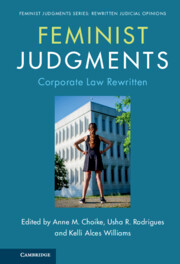Book contents
- Feminist Judgments: Corporate Law Rewritten
- Feminist Judgments Series Editors
- Advisory Panel for Feminist Judgments Series
- Feminist Judgments: Corporate Law Rewritten
- Copyright page
- Dedication
- Contents
- Advisory Panel for Feminist Judgments: Corporate Law Rewritten
- Notes on Contributors
- Acknowledgments
- About the Cover Art
- Table of Cases
- Part I Introduction and Overview
- Part II Legal Personality, Identity, and Limited Liability of Corporate Entities
- 2 Commentary on Citizens United v. Federal Election Commission
- 3 Commentary on Walkovszky v. Carlton
- Part III Role and Purpose of the Corporation and Corporate Combinations in Society
- Part IV Fiduciary Duties in Corporate Governance
- Part V Closely Held Businesses and Other Considerations Regarding the Composition of Boards, Management, and Owners
- Part VI Protecting Investors and Potential Investors in Corporations
- Part VII From Foundations to Future Directions
- Index
2 - Commentary on Citizens United v. Federal Election Commission
from Part II - Legal Personality, Identity, and Limited Liability of Corporate Entities
Published online by Cambridge University Press: 15 January 2023
- Feminist Judgments: Corporate Law Rewritten
- Feminist Judgments Series Editors
- Advisory Panel for Feminist Judgments Series
- Feminist Judgments: Corporate Law Rewritten
- Copyright page
- Dedication
- Contents
- Advisory Panel for Feminist Judgments: Corporate Law Rewritten
- Notes on Contributors
- Acknowledgments
- About the Cover Art
- Table of Cases
- Part I Introduction and Overview
- Part II Legal Personality, Identity, and Limited Liability of Corporate Entities
- 2 Commentary on Citizens United v. Federal Election Commission
- 3 Commentary on Walkovszky v. Carlton
- Part III Role and Purpose of the Corporation and Corporate Combinations in Society
- Part IV Fiduciary Duties in Corporate Governance
- Part V Closely Held Businesses and Other Considerations Regarding the Composition of Boards, Management, and Owners
- Part VI Protecting Investors and Potential Investors in Corporations
- Part VII From Foundations to Future Directions
- Index
Summary
In 2010s Citizens United, the Supreme Court held that corporations do indeed have a right to freedom of speech, just as regular citizens do, and that the government could not restrict expenditures based on an entity’s corporate identity. Citizens United thereby allowed corporate donations to flood into elections. In her feminist judgement, Carliss Chatman breaks with the original opinion and refuses to extend the political speech rights of individuals to corporations. She grounds her analysis in the injustice of affording full personhood rights to corporations – which are artificial persons – even as natural persons like women and minorities have historically not enjoyed such rights and continue to suffer inequality. Amy Sepinwall’s commentary situates and contextualizes the feminist judgment, and then questions a key premise. She suggests an alternate feminist approach focusing on the right of the listener to hear from all perspectives, rather than having one side use spending to dominate – and drown out – other voices.
Keywords
- Type
- Chapter
- Information
- Feminist Judgments: Corporate Law Rewritten , pp. 35 - 61Publisher: Cambridge University PressPrint publication year: 2023



